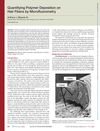 3 citations,
January 2018
3 citations,
January 2018 Amla oil may help treat hair loss.
 3 citations,
November 2017 in “The American Journal of Cosmetic Surgery”
3 citations,
November 2017 in “The American Journal of Cosmetic Surgery” The new Cosmetic Surgery Scar Assessment Scale (CSSAS) was found to be simple and effective in evaluating scars from hair restoration surgeries.
 3 citations,
December 2014 in “Journal of Clinical Oncology”
3 citations,
December 2014 in “Journal of Clinical Oncology” Men with a certain baldness pattern at age 40-50 may have a higher risk of aggressive prostate cancer.
 3 citations,
June 2013 in “Genes & development”
3 citations,
June 2013 in “Genes & development” CaV1.2 helps activate hair follicle stem cells without calcium flux.
 3 citations,
January 2005 in “Biological & Pharmaceutical Bulletin”
3 citations,
January 2005 in “Biological & Pharmaceutical Bulletin” The peptide GPIGS helps hair cells grow and speeds up hair regrowth in mice.
 3 citations,
July 1997 in “Current problems in dermatology”
3 citations,
July 1997 in “Current problems in dermatology” Hair restoration surgery has evolved over time, with a focus on natural-looking results and managing patient expectations, while also considering potential complications and the lifelong progression of male pattern baldness.
 2 citations,
June 2020 in “Skin Research and Technology”
2 citations,
June 2020 in “Skin Research and Technology” MRI reveals thinner scalps and smaller hair follicles in people with androgenetic alopecia.
 2 citations,
January 2019 in “Applied clinical research, clinical trials and regulatory affairs”
2 citations,
January 2019 in “Applied clinical research, clinical trials and regulatory affairs” Different countries have regulations to ensure the safety of hair care products, with some recalling hair straighteners due to high formaldehyde.
 2 citations,
July 2018 in “Elsevier eBooks”
2 citations,
July 2018 in “Elsevier eBooks” Some supplements may help with hair loss, but there's not enough strong evidence to recommend them without doctor advice.
 2 citations,
February 2016 in “Journal of sol-gel science and technology”
2 citations,
February 2016 in “Journal of sol-gel science and technology” A small molecule can strengthen fine hair, making it more resistant and natural-feeling.
 2 citations,
October 2015 in “Primary Care: Clinics in Office Practice”
2 citations,
October 2015 in “Primary Care: Clinics in Office Practice” Doctors should diagnose hair loss by examining the patient and possibly doing tests, and then treat it based on the type, which may prevent permanent hair loss.
 2 citations,
February 2015 in “Journal of Tissue Engineering and Regenerative Medicine”
2 citations,
February 2015 in “Journal of Tissue Engineering and Regenerative Medicine” Transplanting a mix of specific skin cells can significantly improve the repair of damaged hair follicles.
 2 citations,
November 1998 in “Journal of The European Academy of Dermatology and Venereology”
2 citations,
November 1998 in “Journal of The European Academy of Dermatology and Venereology” A patient with a severe type of hair loss experienced partial hair regrowth after treatment with a specific light therapy and a medication called interferon α2a.
 1 citations,
October 2023 in “bioRxiv (Cold Spring Harbor Laboratory)”
1 citations,
October 2023 in “bioRxiv (Cold Spring Harbor Laboratory)” Printing human stem cells and a special matrix during surgery can help grow new skin and hair-like structures in rats.
 1 citations,
July 2019 in “Microscopy Today”
1 citations,
July 2019 in “Microscopy Today” Microfluorometry effectively measures how much polymer coats and penetrates hair, useful for evaluating hair products.
 1 citations,
January 2017 in “Springer eBooks”
1 citations,
January 2017 in “Springer eBooks” Hair follicles are important for drug delivery through the skin, but better methods are needed to understand and improve this process.
 1 citations,
September 2013 in “Elsevier eBooks”
1 citations,
September 2013 in “Elsevier eBooks” Hair ages and thins due to factors like inflammation and stress, and treatments like antioxidants and hormones might improve hair health.
 1 citations,
November 2011 in “Dermatologica Sinica”
1 citations,
November 2011 in “Dermatologica Sinica” Women using hair relaxers with alopecia had lower zinc levels, suggesting zinc deficiency might contribute to hair loss.
 1 citations,
January 2010 in “Springer eBooks”
1 citations,
January 2010 in “Springer eBooks” Certain micronutrients may improve hair and nail health, but more research is needed to confirm their benefits.
 1 citations,
February 2009 in “Dermatologic Surgery”
1 citations,
February 2009 in “Dermatologic Surgery” The International Society of Hair Restoration Surgery recommends that hair restoration surgeons should be skilled in diagnosing and treating hair loss, ensuring patient safety, optimizing aesthetic results, and managing complications.
 1 citations,
September 2003 in “Journal of the Royal Society of Medicine”
1 citations,
September 2003 in “Journal of the Royal Society of Medicine” The book is a detailed guide on hair and scalp diseases, useful for dermatopathologists.
 1 citations,
May 2002 in “Therapeutische Umschau”
1 citations,
May 2002 in “Therapeutische Umschau” Children's hair diseases include compulsive hair-pulling, easily plucked hair, scalp fungal infections, and head lice, each requiring specific diagnosis and treatment.
 1 citations,
June 1938 in “New England journal of medicine/The New England journal of medicine”
1 citations,
June 1938 in “New England journal of medicine/The New England journal of medicine” Hair analysis can offer clues about a person, but individual differences limit making precise identifications.
 November 2024 in “Journal of Translational Internal Medicine”
November 2024 in “Journal of Translational Internal Medicine” Exosomes from stem cells help hair regrowth by activating a specific signaling pathway.
 June 2024 in “Sohag Medical Journal”
June 2024 in “Sohag Medical Journal” Vitamin D is linked to hair health, but more research is needed for its use in treating female hair loss.
 March 2024 in “Buletin de psihiatrie integrativă (Print)”
March 2024 in “Buletin de psihiatrie integrativă (Print)” Hair loss from telogen effluvium can cause mental health issues and lower life quality, needing both medical and emotional support.
 January 2024 in “GeroScience”
January 2024 in “GeroScience” Using radiation to make mice's hair turn gray helps study and find ways to prevent or reverse hair graying.
 November 2023 in “Frontiers in cell and developmental biology”
November 2023 in “Frontiers in cell and developmental biology” Hair aging is caused by stress, hormones, inflammation, and DNA damage affecting hair growth and color.
 October 2023 in “Scientific reports”
October 2023 in “Scientific reports” Dexamethasone affects hair growth by altering levels of proteins that either promote or inhibit hair follicle growth.
 September 2023 in “Stem cell reviews and reports”
September 2023 in “Stem cell reviews and reports” Scientists found a new, less invasive way to get stem cells from horse hair for veterinary medicine.






























